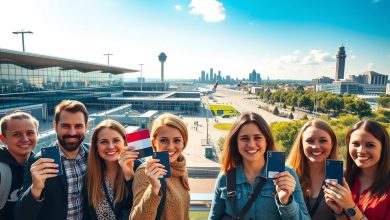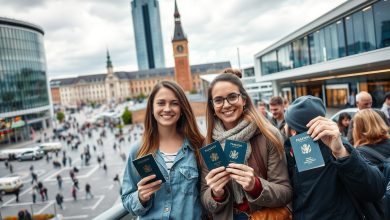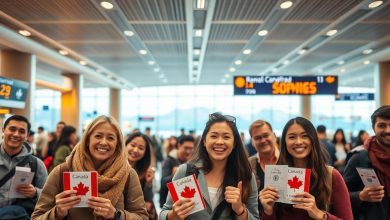Canada Visa Sponsorship and Marriage Visa: The Ultimate Step-by-Step Guide for Your Journey
Anúncios
Navigating the process of reuniting with a loved one in another country can be complex.
For Nigerian applicants, understanding the pathways for spousal sponsorship is crucial. This guide simplifies the steps, requirements, and timelines involved.
Anúncios
The process offers key benefits, including work rights and a path to permanent residency. Applicants must meet federal guidelines, with additional rules for Quebec. Proper preparation ensures smoother approval.
Processing typically takes about 12 months. Medical exams and biometrics play a vital role in the application. Sponsors must also prove financial stability to support their partner.
This guide breaks down each stage, making the journey clearer. Whether applying for the first time or seeking updates, readers will find valuable insights here.
Anúncios
Understanding Canada Visa Sponsorship and Marriage Visa
Reuniting with a partner abroad involves legal pathways designed for family unity. These programs help couples navigate immigration rules while ensuring compliance. Over 80,000 people gain admission annually under family categories.
What Is Spousal Sponsorship?
This process allows a canadian citizen permanent or permanent resident to sponsor their partner. Eligible relationships include legally married couples, common-law partners, and conjugal partners. Proof of genuine commitment is required.
Same-sex marriages are fully recognized. Sponsors must sign a 3-year undertaking to support their partner financially. Quebec applicants follow separate provincial rules.
Key Benefits for Nigerian Applicants
The sponsorship application grants rights to work or study during processing. Successful applicants gain permanent resident status, enabling access to healthcare and education.
- Open work permits for inland applicants
- Family reunification as a core immigration goal
- Dual application for sponsorship and residency
These benefits make the process worthwhile despite the 12-month average wait time.
Eligibility Requirements for Sponsors
Meeting eligibility criteria is the first step for anyone looking to sponsor a partner. The process ensures sponsors can financially and legally support their loved ones. Below are the key conditions to qualify.
Age and Residency Conditions
Sponsors must be at least 18 years old and hold valid status as a citizen permanent resident. Those living abroad must prove plans to return when their partner arrives. Temporary residents or undocumented individuals cannot sponsor.
Financial Obligations and Undertakings
A 3-year financial undertaking is mandatory. Sponsors must show stable income unless exempt. Those sponsoring grandchildren or dependents face higher income thresholds.
Bankruptcy or receiving social assistance (excluding disability benefits) may disqualify applicants. Repayment plans exist for defaults on prior support agreements.
Sponsorship Bars and Restrictions
A 5-year ban applies if a previously sponsored spouse gained permanent residence within that period. Violent or sexual crimes result in permanent inadmissibility.
Proof of residency and clean legal records strengthens the application. Quebec residents follow additional provincial rules.
Who Can Be Sponsored?
Building a life together in a new country starts with knowing who qualifies for sponsorship. Immigration rules recognize several relationship types, each with specific criteria. Below are the key categories eligible for family reunification.
Spouses, Common-Law, and Conjugal Partners
A spouse common-law partner includes legally married couples or those living together for at least one year. Conjugal partner relationships require proof of a committed, year-long bond with barriers to cohabitation (e.g., legal or cultural).
Documentation like joint leases, photos, or affidavits must prove authenticity. Same-sex partnerships hold equal validity. Quebec applicants face additional provincial requirements.
Dependent Children: Age and Status Requirements
Dependent children under 22 qualify automatically. Exceptions include those over 22 if financially reliant due to disabilities. DNA tests resolve disputed parentage cases.
- Adopted children: International adoptions require legal proof.
- Age-freeze: A child’s age locks in once the application is submitted.
- Stepchildren: Eligibility depends on the sponsor’s current relationship with the biological parent.
Extended family (e.g., siblings or parents) generally don’t qualify under this category. Sponsors must meet all federal and Quebec-specific rules for child sponsorships.
Financial Responsibilities of Sponsors
Sponsors take on critical financial duties when bringing a partner to their new home. These obligations ensure the sponsored individual won’t need government aid. Both federal and Quebec rules outline specific requirements.
Understanding the Undertaking Agreement
Sponsors must sign an undertaking, legally binding them to support their partner. This contract lasts three years, even if the relationship ends. Quebec applicants pay an extra $289 CAD fee.
The agreement covers basics like housing and food. It also includes healthcare costs not fully covered by provincial plans. Defaulting triggers repayment demands for any social assistance used.
Duration of Financial Support Obligations
Income requirements vary based on family size. Multi-generational sponsorships follow LICO thresholds. Self-employed sponsors can use asset valuations to prove stability.
Joint sponsorships allow income-qualified couples to combine resources. Divorce doesn’t end the undertaking—sponsors remain liable. Permanent resident status hinges on meeting these terms.
Consequences of Defaulting on Sponsorship
Failing to meet obligations risks legal action. The government can recover social assistance payments from sponsors. Defaults also affect future applications.
- Enforceability: Courts uphold these agreements strictly.
- Immigration loans: Unpaid debts delay future sponsorships.
- Provincial penalties: Quebec imposes additional fines.
Proper planning prevents financial pitfalls. Sponsors must assess their long-term capacity before signing the undertaking.
Inland vs. Outland Sponsorship: Key Differences
Choosing the right sponsorship pathway can significantly impact processing speed and flexibility. Applicants must decide whether to apply from within the country or abroad, each with distinct rules and benefits.
Pros and Cons of Each Route
Inland Sponsorship: Ideal for couples already together in the country. Applicants can qualify for an open work permit within four months. However, they must maintain legal status throughout processing.
Outland Sponsorship: For partners outside canada. Often faster but lacks work privileges during processing. Appeals for refusals are typically handled outside canada through visa offices.
“Inland processing offers stability, while outland routes may expedite reunification for some couples.”
Processing Times and Work Permit Options
Inland applications take 12–18 months but allow open work permit eligibility early. Outland cases are processed faster (6–12 months) if filed in low-volume offices.
- Quebec applicants: Add 2–4 months for provincial approval.
- Biometrics: Nigerian applicants submit these at designated centers in Lagos or Abuja.
- Travel restrictions: Outland applicants face delays if borders close unexpectedly.
Those who live canada and apply inland gain portability rights, but outland processing avoids status dependency risks.
Step-by-Step Application Process
A smooth application process depends on accurate documentation and timely submissions. Following these steps minimizes delays and ensures compliance with immigration requirements.
Step 1: Gathering Required Documents
Start with the IMM 5532 relationship questionnaire to prove genuine ties. Nigerian applicants need country-specific items like birth certificates and police clearance.
- Notarized translations for French/English documents.
- Third-party representative forms, if applicable.
- Passport-sized photos meeting IRCC specifications.
Step 2: Completing the Application Forms
Fill out forms digitally or in black ink. Double-check for consistency with supporting evidence. Common errors include mismatched dates or unsigned pages.
Incomplete submissions risk rejection. A sponsorship evaluation may request additional proof during review.
Step 3: Paying Fees and Submitting Your Application
Total processing fees are $1,290 CAD (excluding Quebec charges). Pay online via credit card or bank draft from Nigeria.
- Courier services like DHL ensure secure delivery to IRCC.
- Keep payment receipts for tracking.
Once submitted, use IRCC’s portal to monitor the application status. Delays occur if biometrics or medical exams are pending.
Required Documents Checklist
Proper documentation forms the backbone of any successful sponsorship case. Missing or incorrect paperwork causes 23% of delays according to IRCC data. This checklist helps Nigerian applicants organize essential files for smooth processing.
Sponsor’s Documentation
Canadian sponsors must provide proof of status like citizenship certificates or PR cards. Recent tax assessments and employment letters verify financial capacity. Those divorced need custody agreements for any dependent children from previous relationships.
Applicant’s Supporting Evidence
Nigerian applicants require police certificates from local stations or INTERPOL. All non-English documents need certified translations with translator affidavits. Medical exams must be completed at IRCC-approved clinics in Lagos or Abuja.
Relationship Proof Requirements
Spouse common-law partners submit 12 months of joint bank statements or lease agreements. Wedding certificates require authentication from the Nigerian Ministry of Foreign Affairs. Social media logs and travel itineraries help demonstrate genuine relationships.
Digital photos must follow strict specifications: 35x45mm size with neutral backgrounds. VFS Global centers handle biometrics collection for the application. Quebec-bound couples need additional CSQ forms from provincial authorities.
Keeping copies of every submitted document prevents issues if files are misplaced. Organize papers in the exact order listed on the checklist to avoid processing holds.
Biometrics and Medical Examination Requirements
Nigerian applicants must fulfill health and identity verification requirements for processing. These steps confirm eligibility and protect public safety for the canada application process.
Where to Complete Biometrics in Nigeria
Designated VFS Global centers in Sterling Bank Plaza (Abuja) and Lekki Phase 1 (Lagos) handle fingerprint and photo collection. Applicants receive a 30-day window after submitting their application to complete this step.
Payment confirmation for the biometric fee must accompany the appointment booking. Premium applicants may access express lanes for faster processing at select locations.
Approved Physicians for Medical Exams
IRCC-authorised clinics in major cities conduct mandatory health checks. Results remain valid for 12 months, but tuberculosis tests require additional screening for Nigerian applicants.
Parents should bring pediatric vaccination records for dependent children. Those with pre-existing conditions must provide treatment histories. Missed appointments can be rescheduled through VFS portals without penalty.
“Complete medical exams early to avoid delays—processing pauses until all health documents are submitted.”
Quebec-Specific Sponsorship Rules
Quebec follows unique immigration rules that differ from other regions. The province quebec requires extra steps for sponsors, including longer financial commitments and language integration. These rules ensure applicants adapt to local culture and legal frameworks.
Additional Requirements for Quebec Residents
A sponsor must sign an undertaking lasting 3–10 years, depending on the sponsored person’s age. Unlike other provinces, Quebec mandates notarized agreements and income verification through Revenu Québec. French language skills are encouraged, with free francization programs available.
MIFI Application Process
Quebec’s Ministry of Immigration (MIFI) issues a Certificat de Sélection du Québec (CSQ) before federal processing. The application requires a $289 CAD fee and dual submissions to provincial and federal offices. Montreal offers settlement resources like job placement aid.
- Language: Basic French proficiency speeds up integration.
- Timing: CSQ approval adds 2–4 months to processing.
- Support: Sponsors prove income via Quebec tax returns.
Open Work Permit for Inland Applicants
Securing work authorization while awaiting permanent residency approval offers flexibility. Inland applicants can work legally during processing, easing financial pressures. This option is ideal for couples already residing together.
Eligibility Criteria
To qualify, applicants must live canada and have a valid temporary status. Sponsored partners need proof of a submitted inland application. Cohabitation with the sponsor is mandatory.
Nigerian applicants must provide police clearances and medical exams. Quebec residents face additional language requirements. Bridge permits cover gaps if current status expires.
Application Process and Timeline
Most open work permit requests process within four months. Submit forms IMM 5710 and IMM 5532 simultaneously with the sponsorship file. Delays occur if biometrics are incomplete.
- Employer conversions: Switch from employer-specific permits freely.
- Implied status: Work rights continue during renewal processing.
- Regulated professions: Additional licensing may apply.
“The open work permit removes barriers, letting couples build their lives without employment restrictions.”
Nigerians should use VFS Global for document submissions. Quebec applicants follow provincial work permit rules. Always verify current fees before applying.
Common Reasons for Application Refusals
Many couples face unexpected hurdles during the sponsorship process. Immigration officials carefully review each case for compliance with strict requirements. Understanding these rejection causes helps applicants strengthen their submissions.
Insufficient Relationship Proof
Authorities require concrete evidence of genuine relationships. Nigerian couples should document cultural practices like weddings or traditional ceremonies. Photos alone rarely suffice—include chat logs, travel receipts, and affidavits from family members.
Age gaps exceeding 10 years often trigger extra scrutiny. Explain cultural norms through notarized statements if applicable. Military service records must match disclosed periods of separation.
Financial Ineligibility
Sponsors must demonstrate stable income through tax returns or employment letters. Recent bankruptcy or social assistance claims raise red flags. Quebec applicants face higher thresholds for multi-person sponsorships.
Gifts or dowry payments require clear documentation distinguishing them from loans. Bank statements should show consistent deposits matching declared income sources.
Criminal Inadmissibility
Past convictions may result in automatic refusal unless rehabilitated. The 5-year rehabilitation rule applies to minor offenses, while serious crimes carry permanent bans. Police certificates must cover all countries where the applicant lived for 6+ months.
“Disclose all prior refusals upfront—concealing them constitutes misrepresentation with a 5-year application ban.”
Nigerian applicants can appeal rejections within 30 days through the Immigration Appeal Division. Successful cases often involve correcting documentation errors or providing additional evidence. Those granted permanent resident status after refusal must maintain clean records to avoid revocation.
After Submission: What to Expect
Understanding what happens after submitting an application eases uncertainty. The process involves updates, potential interviews, and final decisions. Nigerian applicants can track progress through GCKey accounts.
Processing Timelines
Standard processing takes 12 months. Delays occur if medical exams expire or biometrics are pending. Extensions for medical validity are rare but possible.
Visa office transfers may add weeks to timelines. Quebec applicants face extra steps for provincial approval. Regularly check GCKey for real-time updates.
Possible Interview Requests
Some cases require interviews to verify relationships. Sponsor spouse pairs should prepare for questions about shared history. Bring originals of submitted documents.
- Review partner questionnaires beforehand.
- Practice explaining cultural marriage customs.
- Update any changed circumstances (e.g., new jobs).
Receiving Your Decision
Approved applicants get a Confirmation of Permanent Residence (COPR). Nigerian deliveries use DHL, with passports returned via secure courier. Landing fees must be repaid if skipped earlier.
“Keep copies of all correspondence—lost decision envelopes can delay travel plans.”
Rejected cases include refusal reasons and appeal options. Respond within 30 days to contest decisions.
Appealing a Refused Application
When an application faces refusal, understanding appeal options becomes critical for Nigerian applicants. The Immigration Appeal Division (IAD) provides formal channels to contest decisions, but strict deadlines apply. Proper preparation increases success rates significantly.
Valid Grounds for Appeal
Three main arguments can overturn refusals. Procedural errors occur when officers disregard evidence or misapply rules. Nigerian couples should highlight cultural marriage practices that may have been misunderstood.
Humanitarian grounds consider factors like family unity and the right permanent residents have to live together. Recent country condition reports on Nigeria strengthen cases involving security risks or medical needs.
“Gather new evidence before filing—IAD won’t reconsider based on original documents alone.”
Navigating the IAD Process
The sponsorship application appeal starts with Form IMM-5255 within 30 days of refusal. Legal representation isn’t mandatory but improves outcomes for complex cases. Applicants choose between written submissions or oral hearings in English or French.
- Timelines: Hearings typically occur 6-12 months after appeal filing
- Fees: $100 CAD appeal bond required for oral hearings
- Evidence: Submit country-specific documents through VFS Global Nigeria
Pre-hearing conferences clarify issues in dispute. Federal Court judicial reviews remain an option if IAD denies the appeal. Successful cases often involve updated police certificates or medical reports.
Preparing for Life in Canada
Adjusting to a new country involves more than just paperwork—it’s about building a stable future. Nigerian newcomers should leverage settlement services and local resources to ease the transition. Early planning ensures access to healthcare, education, and employment opportunities.
Settlement Services for New Immigrants
Government-funded programs help with language training, job searches, and housing. Free LINC classes teach English or French, while credential recognition services validate foreign qualifications. Nigerian community networks offer cultural support in major cities like Toronto and Calgary.
- Winter preparedness: Local NGOs provide workshops on cold-weather essentials.
- Driver’s licenses: Provincial conversions require knowledge tests and road exams.
- Job strategies: Temporary Foreign Work Permits (TFWP) differ from permanent residence employment rights.
Accessing Healthcare and Education
Most provinces impose a 3-month wait for public health coverage. Private insurance bridges this gap. Schools enroll children with proof of address and immunization records. The canada application process for child benefits begins after arrival.
“Register for healthcare immediately—delays can disrupt essential services for families.”
Newcomers aiming for citizenship canada should track residency days and language progress. Integration programs simplify this journey, offering everything from tax filing help to winter survival guides.
Maintaining Permanent Resident Status
Life as a permanent resident comes with rights and responsibilities to uphold. Meeting residency requirements ensures long-term stability and access to benefits like healthcare and education.
Residency Obligations
Residents must live in the country for at least 730 days within a 5-year period. Time spent abroad with a citizen spouse or on government assignments counts toward this requirement.
Tools like IRCC’s residency calculator help track eligibility. Non-compliance risks losing status, though appeals are possible with valid excuses (e.g., family emergencies).
“Renew your PR card 6 months before expiry to avoid travel disruptions.”
Pathway to Citizenship
After 3 years as a permanent resident, individuals can apply for citizenship canada. The process includes:
- Language tests: Prove English/French proficiency.
- Citizenship exam: Study guides cover history and values.
- Tax filings: Submit 3 years of returns.
Dual nationality is permitted, but Nigerians must check home-country rules. Criminal charges during the waiting period delay eligibility.
Voting rights begin after citizenship approval. New citizens gain unrestricted work permits and priority for family sponsorships.
Conclusion
Completing the journey to reunite with a loved one requires careful planning. Each step—from eligibility checks to document submission—plays a vital role in success.
Professional guidance helps avoid common pitfalls. Post-approval, maintaining status ensures long-term stability. Resources like settlement programs ease the transition.
For sponsor spouse pairs, patience and accuracy are key. The application process may seem daunting, but the reward of family unity makes it worthwhile.
Stay informed, seek support, and celebrate milestones along the way. The path forward is clearer with the right preparation.
For more information explore the official visa website mentioned in this article:
You will be redirected to another website
FAQ
What is spousal sponsorship?
Spousal sponsorship allows a Canadian citizen or permanent resident to sponsor their spouse, common-law, or conjugal partner for permanent residence. The sponsor must meet eligibility criteria and commit to financial support.
Who can be sponsored under family class?
Eligible individuals include legally married spouses, common-law partners (cohabiting for at least one year), conjugal partners, and dependent children under 22 years old (with exceptions).
What are the financial obligations for sponsors?
Sponsors must sign an undertaking agreement to provide basic needs for their sponsored family members for 3-20 years, depending on the relationship. They cannot receive social assistance during this period.
How long does the application process take?
Processing times vary between inland (12 months) and outland applications (up to 24 months). Quebec residents face additional processing due to provincial requirements.
Can inland applicants work while waiting?
Yes, eligible applicants may apply for an open work permit if they submit an inland sponsorship application with complete documentation.
What documents prove a genuine relationship?
Required evidence includes marriage certificates, joint accounts, photos, communication records, affidavits from friends/family, and proof of cohabitation for common-law partners.
Why do applications get refused?
Common refusal reasons include insufficient relationship proof, sponsor financial ineligibility, criminal inadmissibility, or missing documentation. Appeals can be filed within 30 days of refusal.
Where do Nigerian applicants complete biometrics?
Applicants must visit designated Visa Application Centers in Lagos or Abuja to provide fingerprints and photographs as part of the process.
What are Quebec’s additional requirements?
Quebec residents must obtain approval from MIFI (Ministère de l’Immigration) by submitting a separate undertaking application before federal processing begins.
How long must permanent residents stay in Canada?
To maintain status, permanent residents must live in Canada for at least 730 days (2 years) within any 5-year period. Citizenship eligibility requires 3 years of physical presence.
Published on: 8 de June de 2025








